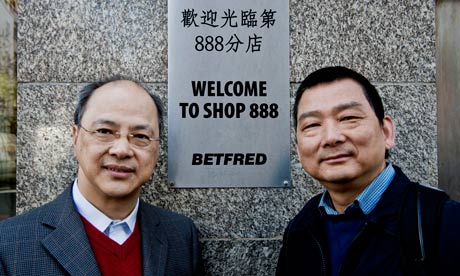Why the Chinese community is a dead cert for bookies
The growing number of bookmakers' shops is compounding gambling problems in Chinatown, says campaigners

Peter Chan (left) and David Li outside a betting shop in Chinatown that is one of more than 100 in Westminster. Photograph: Sarah Lee for the Guardian
Behind the symbolic stone lions that guard the entrance to Chinatown, in London's Soho, the new Betfred betting shop sits like a giant temple. Its black and blue branding has been translated into Mandarin. Inside, an automated ticking throbs continuously, marking the spins on computer-generated roulette games. A Chinese woman sits glued to one machine. A man behind her stamps his feet, paces up and down, and grips her stool. The sign says 20p roulette, but she has just lost £290 in a minute. He slams the machine, and she loads it up again. It is 11.40pm.
Midnight opening is the latest move from an industry taking advantage of a liberalised approach to gambling. Since regulation was relaxed in 2005, bookmakers have started to roll out these highly addictive machines in poorer areas, and now they are extending their opening hours. There are no statistics on the national picture, but eight bookmakers are now open until midnight in Westminster – which includes Chinatown – and a further five in the central London borough are applying to go the same way. Campaigners warn that England is moving towards 24-hour mini-casinos on the high street.
With 120 shops, Westminster already has one of the highest concentrations of bookmakers, so when a new store was proposed on Gerrard Street, 2,000 people in Chinatown signed a petition opposing the development. Formal objections from shop owners, Chinese church leaders, and addicts and their families were made at council and court hearings, but the new Betfred was opened in 2010. Last month hours were extended until midnight.
A spokesman for Westminster council says: "The council looks at each application on a case-by-case basis and if the evidence is there before the application, then we can look at it."
But blocking a shop requires evidence that is virtually impossible to gather before it opens, such as extreme nuisance in terms of criminal disorder or failing to protect children from gambling. The only other way a licence can be revoked by the council or the Gambling Commission is if there is evidence to suggest the gambling on the premises is not being conducted in a fair way. John Travers, a Gambling Commission spokesman, says revoking licences is a "last resort". "If offending persists we can revoke licences. [But] we find that [betting shops] quickly change in response to complaints."
Lack of power
A recent survey by the Local Government Association found 89% of councillors wanted more powers to deal with clustering of betting shops and Mary Portas's review of high streets proposed a change in bookmakers' classification under planning laws to give councils the authority to limit the number of bookies in their area.
Bookmakers' shops are classified in the same way as banks, restaurants and estate agents and can move in where they please. The industry tends to focus on poorer areas. Southwark, in south London, for example, now has 68 active licences.
High Streets First is a new campaign calling on government to give local people the power to limit the number of betting shops in their neighbourhoods. It is co-founded with gambling awareness charity Grasp, and is backed by councils including Ealing, Waltham Forest and Manchester. Nikki Lee, an organiser for the Westminster branch of London Citizens, who supports High Streets First says the Chinese community – particularly migrant workers in the catering sector – is particularly vulnerable to high-street bookmakers. "Gambling is a lifestyle in the catering sector. It's an isolated life with antisocial hours. There's nowhere else to go after work. You know the community is working late so that's the time they're going to want to go in after work and feed their addiction. The whole industry is exploiting that."
In supermarkets around Chinatown leaflets in Chinese from Westfield Casino offer complimentary dim sum for elderly people and free £10 bets.
"It's in our culture," one problem gambler who didn't want to be identified says. "Being on shift work makes us vulnerable, but it is also in our superstition. We let our children gamble at new year. Right from the start we want to find out if it is going to be their lucky year."
Henrietta Bowden-Jones knows about these problems. Based around the corner from Chinatown, her clinic is the only NHS specialist centre in the UK for problem gambling. She is now dealing with 15 referrals a week and has a two-month waiting list. Although the clinic offers promotional materials in Chinese and translation services, in the last year it has seen just seven Chinese patients, or 1.7% of its intake.
"People may not be aware of us, or they may be choosing to access specialist [community] centres," says Bowden-Jones. "Chinese people also have a strong sense of pride and have an important concept of 'face'. Of course it's hard for anyone to admit they have a problem, but the Chinese community is particularly concerned with reputation and privacy.
"Certainly, when we have treated patients there has been no antagonism, just gratitude. Now that we are working with Gambling Concern [a new fundraising charity set up to raise £200,000 for the NHS clinic], we hope to do more targeted work. We would love to look at co-managing cases with Chinese community centres, for example. There has already been some talk of this, it's just a question of resources," she says.
The Christian Centre for Gambling Rehabilitation (CCGR) run by Peter Chan is seeing a huge number of Chinese referrals. Together with David Li, his one staff member, Chan is taking up to 60 referrals a year.
Leung Li is a restaurant worker who attends the clinic and has been gambling since he was 16. Now 45 and divorced, he is still playing even though he knows he has a problem. Eight years ago he lost £42,000 and was forced to sell his restaurant. Today he is battling depression and suicidal thoughts.
It all started, he says, from loneliness: "There's not much to do in England, my English isn't good and there are not many places to go after work … People who worked together used to go gambling after work. I was earning £300 a week and spent almost every penny on the races … It was a good place to meet people."
Too convenient
According to Li, the changing nature of the industry means it is harder to give up now than when he started: "I like the machines. It's really easy to win. You don't have to wait for the races to come in, it's really fast and you can keep going," he says. "In a casino you have to wait for the wheel to go around, but this you just press 'repeat bet'. It's much more dangerous. It's too convenient, it's too easy."
Gambling has repercussions for families, and studies have documented the links between addiction and neglect, debt and violence. Women Together Against Abuse, a four-year project funded by London Councils, found that of 163 cases of domestic violence it dealt with in 2009, up to 30% were related to problem gambling, an increase from 10% two years earlier.
Chan fears that without reform, the suffering he sees will continue to increase.
"If nothing changes the situation will get worse," he says. "The culture of the industry is spreading, and it's not just for us. It's other communities, too. Now people are getting angrier about the shops that never shut. They feel they have no control over changes but suffer the problems of them. Something has to change. Right now the industry is winning and the people are losing. The industry is the only lucky one."
The leading industry body, the Association of British Bookmakers, was contacted for a response but did not reply.
• Rowenna Davis is a founder member of the High Street First campaign

No comments:
Post a Comment
Comments always welcome!